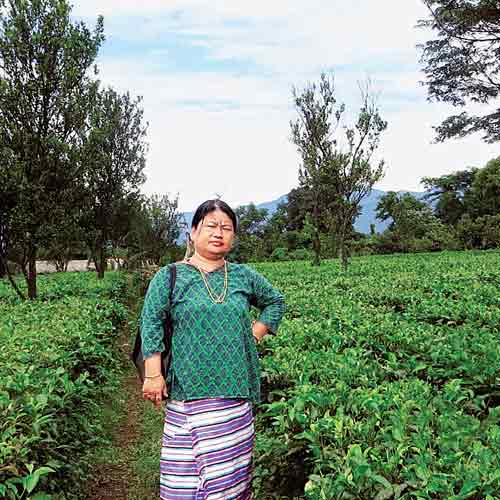
By Prasanta Mazumdar
Wakro (Arunachal Pradesh), Sep 24 :
Basamlu Krisikro - the "Tea Lady" of Arunachal Pradesh.
Songelum, 38, spent all his life cultivating opium until he met Basamlu
Krisikro – the “Tea Lady” of Arunachal Pradesh.Today, he is one among
many inspired by her to replace their opium fields with small-scale tea
plantations in the state’s Lohit district, where tribal Mishmis are in
majority. Opium fetches four times the money for a fraction of the
labour, but Songelum says he has no regrets about walking the path of
tea.
In a place where 99 families in every 100 households grow opium to eke
out a living, he says nobody knows better than Basamlu about how
challenging it is to motivate people to take up an alternative source of
income. “When you go and tell them about an alternative means of
income, they suspect that you have come to destroy their livelihood,”
Songelum said.
A post-graduate from the Delhi University, Basamlu, 39, was working on
orange plantation till an oncologist prescribed a daily dose of organic
green tea for her cancer-struck mother Gutitun, whose illness has since
been arrested. In order to avoid travelling miles often to get the
chemical-free beverage from Assam’s Dibrugarh town, she was struck by
the idea of growing it in her backyard. At that time, the production of
oranges had plummeted drastically.
“As green tea is sustainable, I thought of promoting it among locals,”
she said. From 2009 to 2012, Basamlu grew organic tea on a piece of land
measuring 45 bighas. The tea is processed in her own factory and sold
to both local and international buyers .
Last year, she got a produce of 1,800kg.
“Being a cash crop, opium gives you easy money. People get drawn to
this very easily as the profit is tens times of what you invest. So, it
was very challenging for me to motivate people about growing tea,”
Basamlu says.
Today, she has been able to inspire at least a dozen opium farmers to carry out tea plantation.
Not only does she supply tea plants to them on a deferred payment basis, but she also buys their organic harvest.
Songelum says opium is like an ATM. “No matter where you are and what
the time is, you will get buyers at the drop of a hat,” he says. And one
needs to work hard for only three to four months from December to March
to make a ‘decent’ living for rest of the year, he said. “12 grams of
opium will fetch you Rs650. So, if you have a land measuring one
hectare, you need just Rs6,000-Rs7,000 to get a produce of six to seven
kgs a year.” The Lohit, Anjaw, Tirap and Changlang districts, bordering
China, are notorious for poppy cultivation. Wakro alone has around
12,000 to 13,000 opium cultivators.
Locals say the buyers are all locals who smuggle the narcotic into the
south-east Asian countries through the ‘Golden Triangle’.
Straddling around 367,000 square miles that overlaps the mountains of
Myanmar, Laos and Thailand, the Golden Triangle is a major
opium-producing area of Asia. Doctors say opium addiction is very common
among opium growers.
According to Basamlu, anti-drug agencies come to Wakro only to destroy
crops and not to understand the root cause of the problem.
“What is imperative is awareness at all levels. The government could
set up de-addiction camps and carry out massive awareness campaigns to
curb the menace,” Songelum said..“Opium has ruined our society. In
growing opium, people get addicted to it.
Economic backwardness is the main reason why they go for opium
cultivation. Besides, people’s basic requirements have also increased.
They want their children to attend private schools, possess latest
household appliances, get access to better healthcare services etc. So,
unless you give them an alternative, they will go on cultivating
opium,” Basamlu points out.















+in+Meghalaya.jpg)


